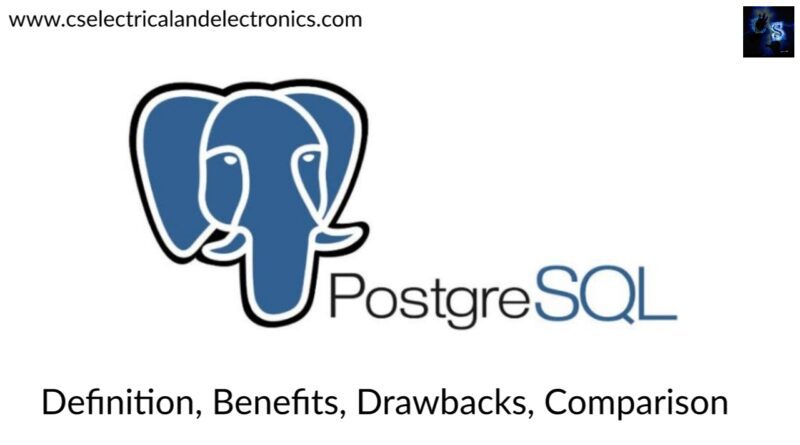What Is PostgreSQL, Feature, Why Used, Benefit, Drawback, Comparison
Hello guys, welcome back to the blog. In this article, I will discuss what is PostgreSQL, the features of PostgreSQL, why it is used, I will also discuss the benefits and drawbacks of using PostgreSQL.
Subscribe our website for more updates. You can also catch me @ Instagram – Chetan Shidling.
Also, read:
- Roadmap To Become A Front End Web Developer, Skills Required.
- What Is Business Analytics, Program Outcome, Career Prospects.
- Key Responsibilities And Technical Experience For Machine Learning Engineers.
PostgreSQL
Postgresql is a powerful open source management system (DBMS). PostgreSQL has earned a robust reputation for its proven architecture, reliability, data integrity, robust feature set, extensibility, and therefore the dedication of the open-source community behind the software to consistently deliver performant and innovative solutions. PostgreSQL runs on all major operating systems, has been ACID-compliant since 2001, and has powerful add-ons like the favored PostGIS geospatial database extender. it’s no surprise that PostgreSQL has become the open-source electronic database of choice for several people and organizations.
What is PostgreSQL?
PostgreSQL is a powerful, open-source object-relational database system that uses and extends the SQL language combined with many features that safely store and scale the complicated data workloads. The origins of PostgreSQL go back to 1986 as a part of the POSTGRES project at the University of California at Berkeley and has quite 30 years of active development on the core platform., and therefore the dedication of the open-source community behind the software to consistently deliver performant and innovative solutions., has been ACID-compliant since 2001, and has powerful add-ons like the favored PostGIS geospatial database extender. it’s no surprise that PostgreSQL has become the open-source electronic database of choice for several people and organizations. Getting started with using PostgreSQL has never been easier – pick a project you would like to create, and let PostgreSQL safely and robustly store your data.
History of PostgreSQL
Postgresql pronounced “post-gress-Q-L”. It was created by stone braker and his team. Today it has become one of the popular open-source databases. Initially released on 8 July 1996, and stable release on 12 November 2020. It is written in C. Is available for the operating system such FreeBSD, Linux, macOS, OpenBSD, windows. And type is RDBMS.
Why Postgresql used?
Postgresql is free and open-source. It supports multiple programming languages, operating systems. PostgreSQL comes with many features aimed to assist developers to build applications, administrators to guard data integrity and build fault-tolerant environments and assist you to manage your data regardless of how big or small the dataset. In addition to being free and open-source, PostgreSQL is very extensible. For example, you’ll define your own data types, build out custom functions, even write code from different programming languages without recompiling your database.
PostgreSQL tries to evolve with the SQL standard where such conformance doesn’t contradict traditional features or could lead to poor architectural decisions. As of the version 13 release in September 2020, PostgreSQL conforms to a minimum of 170 of the 179 mandatory features for SQL:2016 Core conformance. As of this writing, no electronic database meets full conformance with this standard.
Languages support
Postgresql support most leading programming languages and protocols.
- Python
- Java
- Perl
- .Net
- Go
- Ruby
- C/C++
- Tcl
- ODBC
PostgreSQL vs MySQL
| PostgreSQL | MySQL |
| It is less popular | It is more popular |
| It is an open-source project | It is an open-source product |
| The language used to make “C” | The language used to make “C and C++” |
| Single storage engine | Multiple storage engines |
| Support CASCADE option to drop table’s dependent objects e.g., tables and views. | Does not support the CASCADE option. |
| Support many advanced types such as an array, hstore, and user-defined type. | SQL-standard types |
| Support triggers that can fire on most types of command, except for ones affecting the database globally e.g., roles and tablespaces. | Limited to some commands |
| Each new connection is an OS process. | Each new connection is an OS thread. |
| Support both constant and function calls. | Must be a constant or CURRENT_TIMESTAMP for TIMESTAMP or DATETIME columns. |
| PostgreSQL TRUNCATE TABLE supports more features like CASCADE, RESTART IDENTITY, CONTINUE IDENTITY, transaction-safe, etc. | MySQL TRUNCATE TABLE does not support CASCADE and transaction safe i.e,. once data is deleted, it cannot be rolled back. |
Features Of Postgresql
01. Data types:
PostgreSQL provides various kinds of data types to store data in any format. Such as integers, numeric, datatype, js, an XML file may be in the form of also of point line, circle, polygonal and also you can have custom data types so they are various kind of data types like primitive, structure, document, geometry, and customization.
02. Data integrity:
Data is secured. So, basically, whatever data that you have it’s making sure that you know redundancy stored in a proper format help of constraints primary key, foreign key, exclusion constraints, unique constraints, explicit locks.
03. Performance:
Performance that something very important to all of us because all of us wants good performance. For any action that we do on an industry basis. Since Postgre_SQL means, good performance extend implies that you know more than 30+years of active development to enable performance in Postgre_SQL is we have various features like indexing, sophisticated, query planner, multi-version concurrency control, table partitioning, just in time compilation of expressions with so on.
04. Reliability:
Postgre_sql also proves itself in the factor of reliability. That is because you know it has various functions like writing ahead logging, replication, point in time, recovery, active stand by it’s and tablespaces.
05. Security:
TDE, Data Masking you can get a very secure database, which can take care of your most valuable asset.
06. Extensibility:
Obviously, any database that you wish to use you were obviously want extended may be any application that you might be used in the industry. Maybe your company is also on an individual basis.
Benefits of PostgreSQL
01. Open source:
PostgreSQL users can directly participate in the community and they can post and share their inconveniences and bugs in the community.
02. Scalability:
Your Postgre_SQL database can grow with you. There are many more Technical options for operating PostgreSQL at scale. It can be as large as you need to go.
03. Search:
Flexible for your full text search.
04. Security:
TDE, Data Masking you can get a very secure database, which can take care of your most valuable asset.
05. Reduces cost
06. Creation of own functions, triggers, data types, etc. Possible.
07. Community-driven – Reliability
Drawbacks
01. Open source apps support MySQL but not Postgre_SQL.
02. By performance MySQL is faster than Postgre_SQL.
03. Installation is not easy.
04. It utilizes memory a lot.
05. It is not much popular than other database Management systems.
I hope this article may help you all a lot. Thank you for reading.
Also, read:
- Cybersecurity Trends And Challenges In The Digital Age
- Natural Language Processing (NLP) In Computer Science
- Data Science In Action: Real-World Applications
- Software Testing Strategies: Ensuring Quality In Development
- The Evolution of Programming Languages
- Mobile App Development Trends In 2024
- Trends In Frontend Development: Frameworks And Libraries
- Continuous Integration And Continuous Deployment (CI/CD) Pipelines
Author Profile
Latest entries
 All PostsJanuary 5, 2021What Is PostgreSQL, Feature, Why Used, Benefit, Drawback, Comparison
All PostsJanuary 5, 2021What Is PostgreSQL, Feature, Why Used, Benefit, Drawback, Comparison All PostsSeptember 29, 2020Google Cloud Platform, Different Types Of Service Provided By GCP
All PostsSeptember 29, 2020Google Cloud Platform, Different Types Of Service Provided By GCP All PostsSeptember 23, 2020Different Types Of AWS Products (Amazon Web Service)
All PostsSeptember 23, 2020Different Types Of AWS Products (Amazon Web Service)







